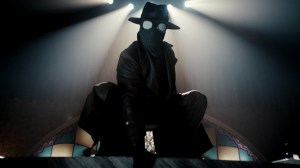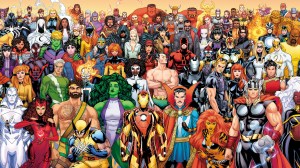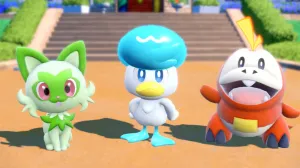Star Trek: Deep Space Nine has long stood out from the other Star Trek television series. It was darker, it took place on a space station instead of a starship, and its main cast includes non-Starfleet characters. And for a long time, it was thought of as the black sheep of the family.
Videos by ComicBook.com
The new documentary What We Left Behind: Looking Back at Star Trek: Deep Space Nine, headed to theaters for one-night-only on May 13th, may dispel that notion as it sheds light on many passionate Deep Space Nine fans.
Producer Kai De Mello-Folsom is himself a relative newcomer to the Deep Space Nine fandom. He spoke to ComicBook.com over the phone about the hidden truth about Deep Space Nine and how the documentary came together.

Tell me about how you came to Deep Space Nine.
Kai De Mello-Folsom: Well, I have to be honest, and this may not be the answer you’re looking for, but I’m very new to Deep Space Nine. I did not grow up watching it on TV. I am a child of the ’90s, and I have to admit I was too young at the time to appreciate it.
So I came to this through my producing partner David Zappone, who had told me about Deep Space Nine for years, and I’d seen bits and pieces of, but had never really appreciated it as a show. He kept telling me that this is the show that’s worth exploring. There’s so much to it. There’s so many great characters. I began watching at night. I immediately realized that he was right, that there’s something special about Deep Space Nine. Sort of even in and above the other Star Trek series.
I was very lucky to come to it sort of just before getting on to this project. I came on to this project in 2016, and at that point I just really started fully investing in the show and binge-watching it. I’ve really come to appreciate it from two levels, not just as a fan but also as a creative involvement in this documentary. I’ve really sort of had a dual layer of interest and involvement in the show, so I’ve been very lucky.
Every Star Trek series has its fans, but Deep Space Nine brings out something different in them. What do you think makes it so special within the Star Trek franchise?
Well, you’re right. I think there are Star Trek fans, and Star Trek fans have certainly their favorite series or the series that maybe brought them into the fold. But I’ve found that there happen to be sort of Deep Space Nine fans separate from the Star Trek fandom. They just love the show as a show. I think having been so close to it on this project, I think the things we’ve found are that it is unique from the Star Trek shows. It’s stationary, for lack of a better term. For the most part, it takes place sort of in one setting, at least in the early years. That allows this kind of character development and this story development in very intimate and unique ways that Star Trek wasn’t necessarily doing at the time.
These are stories that are focusing on character, and very flawed and very conflicted characters. It didn’t necessarily match the vision that Gene Roddenberry had put out initially as this perfect world, this utopia. Deep Space Nine took the universe of Star Trek and certainly honored it, but also said, “look, in any utopia there are fringes, and there are people that are still working it out.” What’s more human than us figuring ourselves out and continuing to work on ourselves and make it better. I don’t believe anything can ever be truly perfect. You’re always going to have something to improve on. Deep Space Nine did such a beautiful job of showing these imperfect situations and imperfect people and still strove to find beauty in that and find humanity in that. I think that’s a huge part of what made Deep Space Nine a success.
In the documentary itself, Ira Steven Behr talked about how the goals of the documentary changed throughout production. For you, what was the goal of this documentary? The mission statement?
Well, I’d have to agree that it really — It changed and evolved as we went through the process. When I was brought on board, David and Ira had already shot a couple of interviews, a couple of roundtables with the cast in Vegas sort of on a shoestring budget and just kind of as they had them all together. Our goal at the time was just to really just put those together and create sort of a retrospective of the show, and to aid that we went to a crowdfunding site, to Indiegogo, just to raise money to sort of license the clips we needed and just do the final polish on the couple hours of interviews they’d done.
We were immediately shocked to find that the fans found out about this and burst through our goal of $150,000 basically overnight. Through that response, we realized that our initial thought that this was sort of a cult following, that it was an underground fandom, that really was not true. We realized that that Deep Space Nine, especially in the age of streaming and of binge-watching, has become even more appreciated and even more loved.
Because of that, we realized we needed to put more energy into getting fan interviews and bringing the family back together, not just at conventions but out of that, for this Variety photo shoot, the 25th-anniversary photo shoot that we actually made happen through the documentary.
Then further, through obviously more fan interviews, finding out what the fans really felt about the show then and now, and also through the writer’s room, which really created this new episode, for lack of a better term, of an imaginary season of Deep Space Nine.
I think the way that the goals of the documentary evolved to not just create a sort of retrospective that anyone could have done, but to actually bring the family back together and do a tribute to the time that they had on Deep Space Nine, more than just the stories, more than just the sort of televised episodes, but really give a sense that Deep Space Nine was loved at the time, which we didn’t quite realize, and is still loved to this day and is something kind of timeless, I think, as far as television shows go. It’s really not lost any of its timeliness in today’s modern world.

A lot of the discussion around Deep Space Nine is about how it was ahead of its time. As someone who has come to Deep Space Nine relatively recently, did it feel very of its time? Or did it feel like something that could be put on the air today with a bit of an HD touchup?
Oh, absolutely. Again, as somebody who’s come to the show in the last five years, the stories that it was telling have not gone out of date. The wonderful aspect of Deep Space Nine is it’s about, again, the characters, and about sort of these gray areas of society and of interaction. Unfortunately, that’s something that’s never going away.
When I watched it, I was obviously aware of the timeframe the show was made, and watching it on streaming and on DVD, there is an aspect of the four-by-three standard definition presentation that inherently, to today’s viewing audience, kind of does date the production of it.
It’s been so incredible seeing it now, and we’ve had the opportunity to remaster it to HD for these select scenes in the film and actually view it in widescreen. While the stories don’t change at all, I mean, they are still absolutely modern sensibilities and ahead of their time for the ’90s, just the presentation, and kind of getting to see them as we’re used to nowadays for modern viewing, kind of just completely takes you out of it. And as you said, it makes it feel like this is a show that could be on the air today no problem. I mean, the issues it’s dealing with are still frankly very, very relevant.
What was the most surprising thing you learned about the show or the most surprising story you heard while putting together the documentary?
Well, I think for me personally, I kept being told that Deep Space Nine was underappreciated, that it was a cult show, that it was not something that was mainstream. I think there’s certainly an aspect of truth to that, but what we’ve really found through this documentary is that maybe that’s not a fair assessment. There are so many fans who did appreciate it at the time, and it was their favorite show then and it’s their favorite show now.
I think that our hypothesis for this documentary that it was sort of a forgotten show was completely blown out of the water by the Indiegogo crowdfunding campaign. I mean, we had 10,000 people within a month who found out about this very minimally publicized campaign and came around it to support the documentary.
There were a lot of, certainly, surprises with little stories from fans and from the cast and crew themselves. But the biggest surprise for me with this show that had claimed to be this dark underdog, this unwatched show, is really not that. It was loved then, and it’s loved now, and I hope it’ll continue to be loved by fans in the future through streaming.
The documentary covers a lot of ground but, as Ira Steven Behr talks about in the film, they couldn’t possibly get to everything. What was the hardest cut to make?
Well, there were so many stories that we didn’t have time for or we didn’t have a second or third perspective on. So we had to make some hard decisions. But for me personally, I was given the very lucky task early on of sort of shepherding the writers’ room eighth season story.
Our two main editors, Joe [Kornbrodt] and Luke [Snailham], were very quickly overwhelmed by just the amount of interviews and archival footage that we had. So as a favor to them, I jumped in and sort of started editing the writers’ room, which is about six hours of Ira and the gang talking.
As soon as I jumped into that, I didn’t let it go, because it was just such a unique opportunity and it was such a fun opportunity. So, for me personally, the hardest thing was just losing a lot of the side stories that they came up with in that writer’s room for the episode.
But not only that, the humor and the back and forth that a lot of these writers had in the room. They joked with each other about mistakes that were made at the time, and Hans Beimler had a recurring joke about the bathrooms in space, that he’d always wanted to get in on the show and just couldn’t. Ron Moore’s version of how time travel works. I mean, they had all the inside jokes, and the moment they were back in this writer’s room in 2015, they were immediately back to their old sensibilities and humor and the back and forth they had.
For a long time we had that in the cut for the writers’ room, a lot of that stuff in, but it was about 40 minutes and it did not get to the story that we were trying to tell. We keep cutting back to this writer’s room about five times throughout the film, so it’s the sort of backbone for the documentary. We realized, as much as we love these humorous moments and all of these sort of side stories, they took us out of the story of episode one of season eight, and we really had to be careful to just tell only the really relevant things to that plot in order to keep it something that people could follow.
We really hope that at some point we’ll be able to release a longer version of the writer’s room sort of in its entirety, because there’s so much, whether it’s relevant to the story or not, but was just so much fun to watch. That’s personally for me been the hardest part to lose from this film.
Hopefully, this film will bring some new eyes to Deep Space Nine. As someone who came to it recently yourself, any particular episodes you’d suggest new fans check out as a taster?
Well, I think for somebody who really wants to enjoy Deep Space Nine, they have to start from the beginning. I mean, it’s a serialized show, and there’s really no way to jump into it truly without starting at the beginning with the pilot.
But I would say that for people who may have been like me, who may have understood Deep Space Nine to be different than Star Trek, to be a darker, less inclusive and uplifting show, I think that they should give it a try. They should find for themselves that that’s really not the case, that it does stand alone as far as the Star Trek universe, but it also is inherently Star Trek. It is the values and the hopefulness that Star Trek has always included.
It’s just told in a way that, I think, for a modern audience is much more intimate and compelling and tells a more long-form story than they were able to do in the other shows. I think for anybody who’s been on the fence about it, there’s no better way to jump in than to start at the beginning and give it a shot. Perhaps with today’s streaming and binge-watching, it’ll be something that they can enjoy even more than when it was on at the time.
*********************
—–
Have you subscribed to ComicBook Nation, the official Podcast of ComicBook.com yet? Check it out by clicking here or listen below.
In this latest episode, we go all in on the Spider-Man: Far From Home trailer and Disney’s big announcement of movie releases! Is Spider-Man introducing the multiverse? Will Aladdin or Lion King be the live-action remake king this summer? Make sure to subscribe now and never miss an episode!








